
French Prime Minister François Bayrou faces a confidence vote on Monday, which he is expected to lose, plunging the euro zone's second largest economy deeper into political crisis. Here's a quick rundown of how the country got here and what we might expect from the vote.
How did we get here?
France's politics have become increasingly fraught since President Emmanuel Macron bet big by calling a snap parliamentary election in 2024 which resulted in three political blocs in parliament, none of which had an outright majority.
Macron's control over parliament weakened as France's debt ballooned, in part due to bailing out the economy during the Covid pandemic and cost-of-living crises. France is now under acute pressure to fix its finances.
Public debt has climbed to 113.9 percent of GDP, and last year's deficit was nearly double the EU's 3 percent limit.
France's debt: how did we get here, and how dangerous is it?
Saying tough decisions were needed, Bayrou, a veteran centre-right politician and Macron's fourth prime minister since his re-election in 2017, sought to pass a budget for 2026 that would require nearly 44 billion euros in savings – largely through cuts to public spending and scrapping two public holidays.
This provoked an outcry from opponents. Unable to see a path to adoption, Bayrou on 25 August called a confidence vote on his fiscal strategy, in a gamble the opposition called political suicide.
Opposition parties have made clear they would vote him out, and they have more than enough members of parliament to do so.
French parliament set to eject PM in blow to Macron
What happens on Monday?
The National Assembly convenes at 1500 (1300 GMT) and Bayrou will open with a speech. With almost no hope of winning, the speech will be for the record – or his political future should he decide to run for president in 2027 – rather than to try to convince lawmakers.
The 10 parliamentary groups will respond, and then vote. Lawmakers will each drop a paper ballot into an urn.
The result is based on an absolute majority of votes cast – not of the total 577 seats.
If, as expected, the government loses, Bayrou must then submit his resignation to Macron.
There is no official schedule for that, but the outcome of the vote would be expected to be sometime around 1730-1800 GMT.
What happens next?
If Bayrou does lose the vote, it's all in Macron's hands – he could either name another prime minister, call snap elections or resign.
The president has so far resisted the idea of calling for snap elections and seems more inclined to look for a new prime minister.
That could be someone from the centre-left, after four centre-right picks failed to manage the fractured parliament, or he could name a technocrat. There are no rules governing who Macron must choose, or how quickly.
If Macron takes his time, Bayrou could stay on in a caretaker capacity, as was the case when the previous Barnier government fell.
The far-right National Rally and hard-left France Unbowed parties are pushing for snap parliamentary elections and for Macron to resign – an option he has ruled out.
President Macron vows to serve out his term despite budget crisis
At a lunch last week including Macron and centrist and conservative parties that back the current government, all agreed a dissolution of parliament would not solve the crisis, a source close to Macron told Reuters news agency, adding that striking a deal with the Socialists seemed like one of the only viable options.
A government source confirmed a snap parliamentary election did not seem on the cards for now, adding that Finance Minister Eric Lombard, former Socialist prime minister Bernard Cazeneuve, and Court of Auditors chief Pierre Moscovici, also a long-time Socialist, were among names circulating as possible choices for the next prime minister.
Beyond the fate of the government, France faces a tense September:
- On 10 September: the grassroots Bloquons Tout ("Let's block everything") movement, that has mushroomed on social media, plans nationwide protests.
- On 12 September: Fitch reviews France’s credit rating. A downgrade is possible if the crisis deepens.
- On 18 September: Trade unions hold strikes and protests.
(with Reuters)







